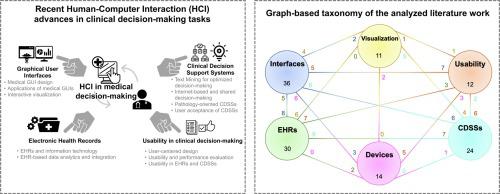Journal of Biomedical informatics ( IF 4.5 ) Pub Date : 2020-06-17 , DOI: 10.1016/j.jbi.2020.103479 Leonardo Rundo 1 , Roberto Pirrone 2 , Salvatore Vitabile 3 , Evis Sala 1 , Orazio Gambino 2

|
The ever-increasing amount of biomedical data is enabling new large-scale studies, even though ad hoc computational solutions are required. The most recent Machine Learning (ML) and Artificial Intelligence (AI) techniques have been achieving outstanding performance and an important impact in clinical research, aiming at precision medicine, as well as improving healthcare workflows. However, the inherent heterogeneity and uncertainty in the healthcare information sources pose new compelling challenges for clinicians in their decision-making tasks. Only the proper combination of AI and human intelligence capabilities, by explicitly taking into account effective and safe interaction paradigms, can permit the delivery of care that outperforms what either can do separately. Therefore, Human-Computer Interaction (HCI) plays a crucial role in the design of software oriented to decision-making in medicine. In this work, we systematically review and discuss several research fields strictly linked to HCI and clinical decision-making, by subdividing the articles into six themes, namely: Interfaces, Visualization, Electronic Health Records, Devices, Usability, and Clinical Decision Support Systems. However, these articles typically present overlaps among the themes, revealing that HCI inter-connects multiple topics. With the goal of focusing on HCI and design aspects, the articles under consideration were grouped into four clusters. The advances in AI can effectively support the physicians’ cognitive processes, which certainly play a central role in decision-making tasks because the human mental behavior cannot be completely emulated and captured; the human mind might solve a complex problem even without a statistically significant amount of data by relying upon domain knowledge. For this reason, technology must focus on interactive solutions for supporting the physicians effectively in their daily activities, by exploiting their unique knowledge and evidence-based reasoning, as well as improving the various aspects highlighted in this review.
中文翻译:

HCI在用于优化临床工作流程和精密医学的决策任务中的最新进展。
尽管临时性的,生物医学数据的不断增加也使新的大规模研究成为可能。需要计算解决方案。最新的机器学习(ML)和人工智能(AI)技术一直在实现卓越的性能并在临床研究中产生重要影响,其目标是精准医学以及改善医疗保健工作流程。但是,医疗保健信息源中固有的异质性和不确定性给临床医生在其决策任务中提出了新的挑战。只有通过明确考虑有效和安全的交互范式,正确地组合AI和人类智能功能,才能提供优于任何一方单独执行的护理服务。因此,人机交互(HCI)在面向医学决策的软件设计中起着至关重要的作用。在这项工作中界面,可视化,电子病历,设备,可用性和临床决策支持系统。但是,这些文章通常会在主题之间出现重叠,表明HCI将多个主题相互联系。为了专注于人机交互和设计方面,所考虑的文章分为四个类。人工智能的进步可以有效地支持医生的认知过程,因为人们的心理行为不能被完全模仿和捕捉,因此在决策任务中当然起着核心作用。即使没有统计学意义上的大量数据,人类大脑也可以依靠领域知识来解决一个复杂的问题。因此,技术必须专注于交互式解决方案,以通过利用其独特的知识和基于证据的推理来有效地支持医生的日常活动,


























 京公网安备 11010802027423号
京公网安备 11010802027423号